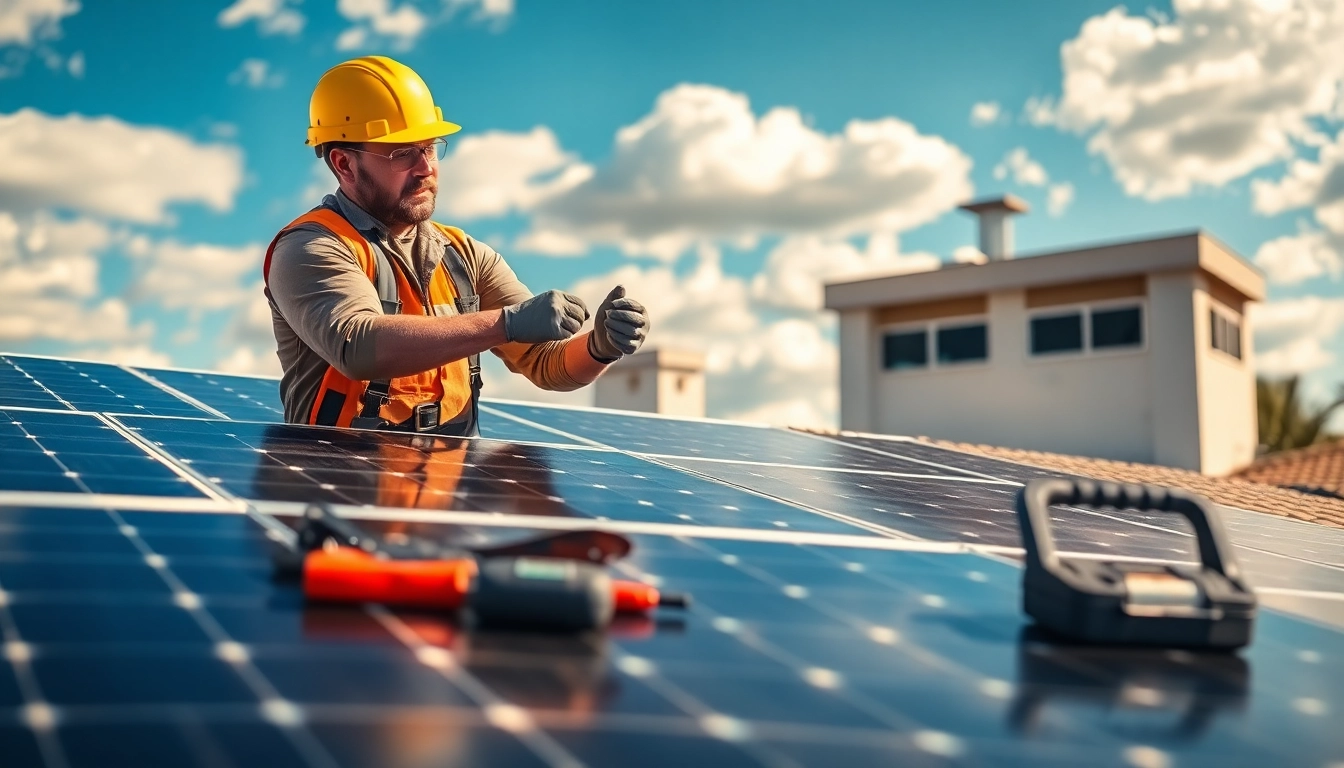Understanding the Importance of Pigeon Proofing Solar Panels Phoenix
Pigeons, while often seen as harmless city-dwellers, pose a significant threat to solar panels, particularly in urban environments like Phoenix. As more homeowners invest in solar energy, understanding how to protect these systems from the destructive behaviors of pigeons becomes crucial. When searching for solutions, Pigeon proofing solar panels Phoenix is a vital topic that should concern every solar panel owner. This article will delve into why pigeons are attracted to solar panels, the consequences of unprotected systems, and effective pigeon-proofing methods.
Why Pigeons Are Attracted to Solar Panels
Pigeons are drawn to solar panels primarily because they provide a safe and secluded environment. The flat surfaces and sheltered spaces underneath these panels offer an appealing nesting site away from predators. Additionally, urban landscapes often lack natural habitats, pushing pigeons to urban rooftops and solar installations where they can establish comfortable homes. Moreover, the reflective surfaces of solar panels can attract pigeons, confusing them during flight, making these installations prime real estate for unwanted avian inhabitants.
Consequences of Unprotected Solar Panels
The effects of pigeon infestations on solar panels can be detrimental. First and foremost, pigeon droppings are highly acidic and can cause substantial damage to the panels themselves. This corrosion can lead to reduced efficiency and, eventually, costly repairs. Furthermore, nests and debris can obstruct solar cells, significantly diminishing their effectiveness and leading to a lower energy output.
In addition to physical damage, unprotected solar panels may also attract other pests, creating a cascade effect of problems that can complicate maintenance. Over time, these issues can lead to decreased lifespan and functionality, frustrating homeowners who made a substantial investment in renewable energy.
Identifying Signs of Damage and Infestation
Recognizing the signs of pigeon infestation and damage early can save homeowners from significant setbacks. Common indicators of a problem include:
– Visible Nesting Materials: Twigs, feathers, or other debris around the solar panels or on the roof.
– Droppings: Accumulation of pigeon droppings can indicate a persistent presence, leading to potential damage.
– Physical Damage: Cracks or corrosion on the panels may signal the corrosive effects of droppings over time.
– Reduced Energy Output: Monitoring the energy production of solar panels can alert homeowners to potential issues.
By regularly inspecting solar installations, homeowners can identify issues before they escalate.
Effective Methods for Pigeon Proofing Solar Panels Phoenix
As the importance of safeguarding solar panels becomes evident, various methods for pigeon proofing have emerged. Here, we discuss practical solutions that homeowners can implement to deter pigeons effectively.
Physical Barriers: Spikes and Nets
One of the most straightforward and effective ways to keep pigeons away is by installing physical barriers. Bird spikes and nets create an unwelcoming environment for pigeons, preventing them from landing or nesting on solar panels.
– Bird Spikes: These are typically made of stainless steel or plastic and can be easily affixed to ledges or around the perimeter of solar panel installations. They deter birds without causing harm, effectively making landing impossible.
– Bird Nets: Installing nets around solar panels forms a physical barrier that blocks access to the undercarriage of the panels. These nets should be made of durable materials that can withstand weather conditions while remaining unobtrusive.
Both options can be highly effective, though their installation may be best handled by professionals to ensure proper placement and effectiveness.
Visual and Auditory Deterrents
Beyond physical barriers, utilizing visual and auditory deterrents can complement pigeon-proofing efforts. Various devices can disrupt the settling patterns of pigeons or make areas seem less appealing.
– Reflective Surfaces: Items such as reflective tape, old CDs, or aluminum foil can disorient pigeons and discourage them from approaching. Hanging these elements from the roof or nearby structures can create an effective barrier without much expense.
– Sound Deterrents: Devices that emit sounds of predators or other noises can effectively scare pigeons away. However, homeowners should weigh the potential disturbance to themselves and their neighbors against the benefit this deterrent may provide.
While these methods may not be standalone solutions, they can supplement physical barriers to create a comprehensive defense strategy.
Chemical Repellents: Pros and Cons
Chemical repellents provide another avenue for deterring pigeons, though these should be approached with caution. Some chemical products are marketed for use in rodent and pest control, while others are designed specifically for bird deterrence.
Pros:
– Immediate results can be achieved with proper application.
– Many products are easy to implement and do not require physical installations.
Cons:
– Chemical repellents may wash away in rain or over time, necessitating reapplication.
– Concerns regarding environmental impact and potential harm to other wildlife should prompt careful consideration before use.
Ultimately, homeowners should weigh the benefits against potential downsides, particularly regarding environmental concerns and effectiveness.
DIY vs. Professional Pigeon Proofing Solutions
When it comes to pigeon proofing solar panels, homeowners often face the decision of undertaking the work themselves or hiring professionals. Each alternative carries distinct benefits and considerations.
Evaluating Your Options: Cost vs. Effectiveness
Understanding the costs associated with both DIY and professional services is crucial for making informed decisions.
– DIY Pigeon Proofing: Costs are typically lower, primarily involving the purchase of materials like spikes, nets, or deterrents. However, many homeowners may lack the skills necessary for effective installation, potentially leading to higher costs down the line due to ineffectiveness.
– Professional Services: While hiring experts can be pricier, it may ultimately save money by ensuring proper installation and long-lasting results. Professional services also often include maintenance packages that can enhance long-term effectiveness.
Ultimately, the decision boils down to budget, expertise, and individual preferences regarding effort and commitment.
Tools and Materials for DIY Projects
For those opting for a DIY approach to pigeon proofing, understanding the necessary tools and materials is essential. Here are some essentials that can facilitate your efforts:
– Bird Spikes: Available in various lengths and configurations, suitable for different surfaces.
– Nets: Depending on the design, nets can vary in strength and density; choosing the right one for your climate is vital.
– Reflective Materials: Items such as reflective tape or old CDs can serve as cost-effective deterrents.
– Adhesives or Installation Hardware: Ensure you have screws, anchors, or other necessary hardware to affix materials securely.
Planning your approach and gathering the right tools can streamline the project, leading to better outcomes.
When to Hire Professional Services
Knowing when to call in the experts can save time and prevent future problems. Professional services may be necessary when:
– Severe Infestations: If pigeons have already established significant nests or damage, professional intervention is crucial for effective eradication.
– Complex Installations: For larger or multi-solar panel systems that require extensive installation techniques, professionals can ensure safety and compliance with local regulations.
– Lack of Time or Expertise: Homeowners with limited experience or time constraints may benefit from entrusting the task to seasoned professionals who can complete the job efficiently.
Prioritizing safety and effectiveness is key when choosing between DIY and professional solutions.
Maintenance and Monitoring After Pigeon Proofing Solar Panels Phoenix
Once pigeon proofing measures are in place, consistent maintenance and monitoring ensure their effectiveness. Regular attention can prevent new infestations and preserve the longevity of solar systems.
Regular Inspections: What to Look For
Post-pigeon proofing, establishing a schedule for inspections is paramount. Homeowners should look for:
– Signs of Re-infestation: This includes droppings or nesting materials that could signal new birds entering the area.
– Physical Damage: Checking for any wear and tear on installed deterrent systems is essential for ensuring effectiveness.
– Energy Output: Monitoring the energy output of solar panels can help identify issues. Any significant dips in production could warrant further inspection.
Frequent inspections can help catch problems early, ensuring timely solutions can be implemented.
Cleaning Tips to Prevent Re-infestation
Keeping solar panels and surrounding areas clean is essential for preventing re-infestation. Regular removal of droppings and debris can create an unwelcoming environment for pigeons. Consider these tips:
– Power Washing: Regular schedules for power washing panels can prevent build-up that attracts pigeons and compromise panel efficiency.
– Debris Removal: Clearing potential nesting materials or food sources routinely can deter pigeons from returning.
– Proper Waste Disposal: Ensuring that garbage and other attractants are secured can dissuade birds from frequenting the area.
Establishing a maintenance routine can uphold the effectiveness of your pigeon-proofing strategies.
Adjustments for Seasonal Changes
As seasons change, so do the behaviors and patterns of many animals, including pigeons. Adapting your pigeon prevention strategies according to seasonal patterns can enhance your efforts.
– Spring and Summer: Pigeon activity typically peaks during nesting seasons. Increased vigilance and proactive measures should be taken during these months.
– Fall and Winter: While activity may decrease, it is essential to keep systems clear and maintained as pigeons may seek shelter during colder months.
Adapting strategies as needed ensures that your approaches remain effective throughout the year.
Real-life Case Studies and Success Stories
Understanding how others have successfully implemented pigeon proofing measures can provide valuable insights. Here are some real-life examples of effective strategies.
Homeowner Testimonials: What Worked Best
Many homeowners have found great success with a blend of various pigeon-proofing techniques. For example, one homeowner reported significant improvements in energy output after installing bird spikes combined with reflective tape. They expressed relief that system efficiency not only increased but that maintenance became less frequent.
Another homeowner shared that professional installation of nets greatly reduced their infestations. They highlighted the importance of routine inspections performed by the service provider, allowing for timely adjustments and monitoring.
These testimonials illustrate the benefits of tailored approaches for successful pigeon management.
Before and After: Visual Impact of Pigeon Proofing
Homeowners often share compelling before-and-after photos illustrating the visible impact of effective pigeon proofing. For example, a roof littered with droppings and nesting materials transformed into a clean, well-maintained environment once physical deterrents were installed.
Results like these resonate with prospective buyers who may find the effectiveness of these solutions reassuring. Homeowners keen on investing in solar energy can feel confident about pigeon-proofing efforts, contributing to cleaner and longer-lasting installations.
Long-term Benefits of Investing in Pigeon Proofing
Investing in pigeon proofing not only protects solar panels but also enhances overall property values and energy efficiency in the long run. Homeowners can avoid costly repairs and mitigate loss of productivity caused by pigeon-related issues.
Ensuring solar systems remain clean and intact averts additional expenses, preserving the initial investment. The benefits of effective pigeon proofing can lead to a smoother energy transition, making renewable resources more appealing.
Continuously reinforcing these preventive measures and maintaining clean installations amplify both the financial and environmental advantages for homeowners in Phoenix.



